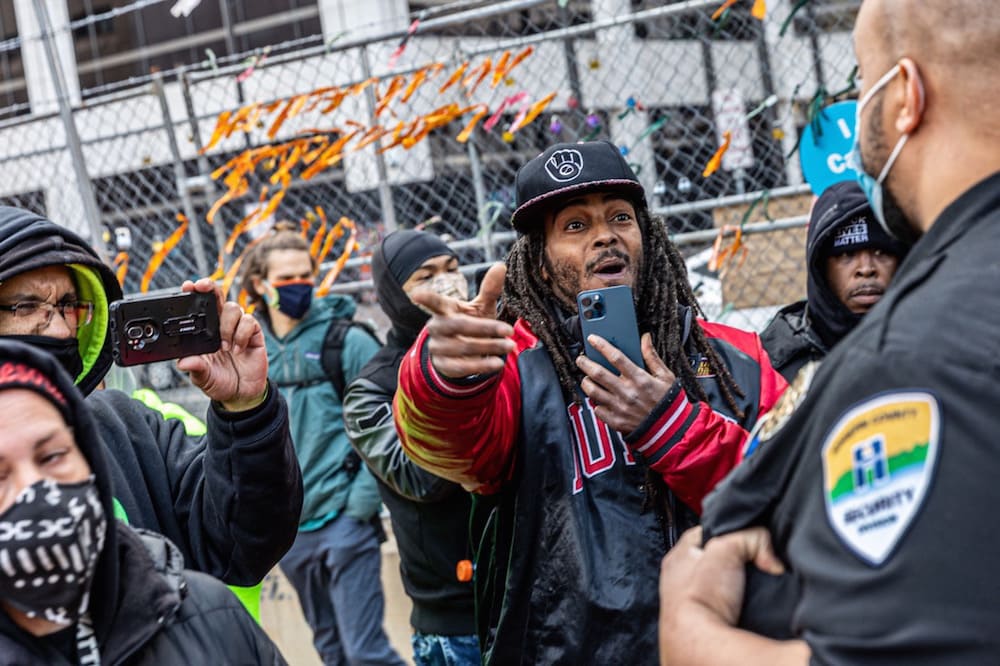EFF argues that Americans have the right under the First Amendment to livestream and record on-duty police officers and officers who interfere with that right should be held accountable.
This statement was originally published on eff.org on 13 December 2021.
You have the right under the First Amendment to livestream and record on-duty police officers and officers who interfere with that right should be held accountable. That’s what EFF told the Fourth and Tenth Circuit Courts of Appeals in amicus briefs filed in November. EFF is supporting the plaintiffs in those cases, Sharpe v. Winterville and Irizarry v. Yehia, who are suing police officers for violating their right to record.
After police officers beat Dijon Sharpe during a traffic stop, he decided that next time he was in a car that was pulled over, he would livestream and record the police. So in October 2018, Sharpe, sitting in the passenger seat of a stopped car, took out his phone and started livestreaming on Facebook. When an officer saw that he was livestreaming, he grabbed Sharpe and tried to take the phone. Sharpe filed a civil rights lawsuit for the interference, a federal district court dismissed his claims in two opinions, and he appealed.
Abade Irizarry was recording a traffic stop as a bystander when another police officer interfered. The officer shined lights into Irizarry’s phone camera, stood between the camera and the traffic stop, and menaced Irizarry with his car and blasted him with an air horn. Irizarry appealed after a federal district court dismissed his lawsuit.
EFF thinks these officers should be held accountable. The First Amendment protects people who gather and share information, especially when it is about official misconduct and advances government accountability. Police body cameras point towards the public, effectively surveilling those already being policed. The civilian’s camera, by contrast, is appropriately pointed towards the officer. Ordinary people’s livestreams and recordings of the police have always been necessary to inform the public – before the police murder of George Floyd went viral in June 2020, there was the beating of Rodney King in March 1991.
But in the digital age, with the proliferation of smartphones with cameras and access to social media platforms, the right to record has become even more important, powerful, and accessible. Earlier this year, the Pulitzer Prize board awarded a special citation to Darnella Frazier, who recorded the shocking police murder of George Floyd on her phone. The board commended her for “courageously recording the murder of George Floyd, a video that spurred protests against police brutality around the world, highlighting the crucial role of citizens in journalists’ quest for truth and justice.”
Recording the police, while constitutionally protected, does have risks. Unfortunately, police officers often retaliate against people who exercise their right to record. In those situations, it is particularly important for people to be able to livestream them, like Sharpe did. If a person livestreams an encounter with a police officer, they can publish at least part of the encounter even if the officer retaliates and forces them to stop. The officers in Sharpe’s case claim, without evidence, that because livestreaming gives viewers real-time information about where officers are, it poses a greater risk to officer safety than recording. However, a bifurcated right to record but not livestream would confuse people, leave officers in the impractical position of having to verify what the person is doing with their phone, and stifle police accountability.
Finally, EFF argued that qualified immunity should not protect officers who violate someone’s clearly established right to livestream and record. Not only did the Supreme Court long ago decide that the First Amendment protects gathering and publishing information, but several federal circuits have specifically applied this to recording the police. Police officers know that when they use their extraordinary powers, the public has the right to watchdog and record them. When the police violate that right, the public must be able to hold them accountable.



